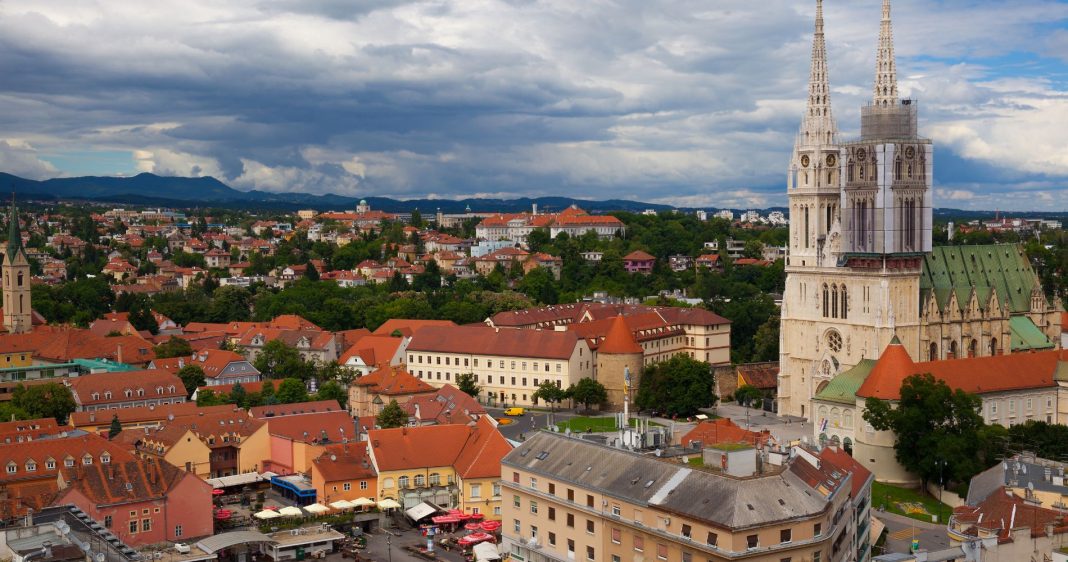Mr. Michalis Charokopos, Head of the Economic and Commercial Affairs Office Embassy of Greece in Zagreb, talks to Ambrosia Magazine about the excellent reputation Greek food and beverage products enjoy among Croatian consumers, giving the essential tips and tricks to enter the Croatian market. Mr. Charokopos also emphasizes the importance of Croatia’s accession to the Eurozone and the Schengen area in 2023 and explains the way this development could lead to further improvement for the presence of Greek f&b products in the market of the neighbouring country.
Interview: Charitomeni Vonta
What would you say is the greatest asset of Greek f&b products in your market?
The greatest asset of Greek f&b products in the Croatian market is their excellent reputation. This reputation does not derive from occasional or temporary success of random products. On the contrary, it is the outcome of the persistent efforts of Greek producers and exporters to provide high quality f&b products. Starting from this premise, Greek f&b products have a great potential in the Croatian market because local consumers and incoming tourists are increasingly interested in quality and healthy food. Being a Mediterranean country, Croatia focuses more and more on Mediterranean diet, traditional flavors, and quality fruits and vegetables. Thus, Greek producers have a considerable comparative advantage due to the favorable climatic conditions in Greece and the long tradition in products like olive oil. Building on the valuable asset of reputation and combining high quality with elegant packaging and targeted promotion to the Croatian market could be the guiding principles for a Greek f&b company interested in exporting to Croatia.
Which Greek products have the greatest potential, and how could their dynamics improve?
Food expenditure in Croatia is expected to register an average annual growth of 4%, with the relevant amount reaching €8,1 billion in 2026 (FitchSolutions, Croatia Food & Drink report). In particular, the category of fruits is expected to record the highest spending growth, as the average annual growth rate for fresh and canned fruit is forecasted to reach 9,8%. Thus, the relevant expenditure will increase from €0,9 billion in 2022 to €1.3 billion in 2026. Moreover, a discernible long-term trend is the growing demand of the Croatian consumer for convenience, which is expected to boost spending on food such as healthy snacks and ready-to-eat meals.
Mindful of the aforementioned trends, it is realistic to say that the presence of Greek f&b products in the Croatian market has significant room for further improvement, especially after Croatia’s accession to the Eurozone and the Schengen area, in 2023. In particular, food categories with considerable opportunities are the following: (i) olive oil and table olives, (ii) fruits and vegetables (tomatoes, cucumbers, citrus fruits, watermelons, strawberries, grapes), since Greece has a comparative advantage in terms of climate, as well as steamed frozen vegetables, (iii) dairy/cheese products with emphasis on yogurt and feta, (iv) nuts and especially pistachio of Aegina, (v) legumes, (vi) meat products like gyros, (vii) pies and (viii) traditional pastries and sweets (like pasteli, mastic, halva). On top of that, Croatia’s well-developed tourism industry presents great opportunities for premium f&b products. Last, there is a significant untapped potential for Greek table wine. Greek wine is intertwined with the Mediterranean culinary culture. Hence, there is ample room for it in a market increasingly interested in quality Mediterranean products.
Bearing in mind the quality of Greek f&b products, targeted promotional activities and networking with local distribution channels can contribute significantly to improving their dynamics in the Croatian market. The Office for Economic and Commercial Affairs of the Embassy of Greece in Zagreb is always prompt to provide assistance to any Greek exporter. In addition, it has issued two reports on the food and the fruit and vegetable sectors, available at the following links: http://tinyurl.com/bderfpvs / http://tinyurl.com/fx3r6rmh
What is the biggest challenge for companies or brands who want to do business in your country?
Croatia is an EU member state since 2013 and joined the Eurozone and the Schengen area in 2023. As a result, there are no major barriers in entering the Croatian market. However, as it happens with any market, exporters of f&b products need to familiarise with the particular features of the Croatian market and convince local companies to initiate a new partnership. Gaining the trust of the Croatian consumer is the most challenging task for companies intending to enter the Croatian market. This requires a systematic and persistent approach combining the choice of the appropriate partner in the local market with the adoption of a well-structured promotional strategy.
What are the targeted actions taken to improve the position of Greek f&b products and to enhance exports to your market?
F&B products are a key priority sector of the annual program of the Office for Economic and Commercial Affairs of the Embassy of Greece in Zagreb. Intending to promote Greek f&b exports in Croatia the Office’s operation is structured around two pillars:
First, it monitors the current trends of the market, issues reports, provides networking for Greek companies and shares insights on the Croatian market by participating in information events, meetings or workshops organized by Greek business institutions, chambers and associations (for instance, the Athens Chamber of Commerce and Industry, the Hellenic Federation of Enterprises and the Athens Chamber of Small and Medium Industries).
Second, it cooperates with Greek associations, private entities and regional Authorities in organising targeted promotional events of Greek gastronomy. Let me elaborate on this by providing a couple of concrete examples. Last October, in cooperation with the Chef’s Club of Greece and the organizers of Taste the Mediterranean Festival (the widely acclaimed gastronomy event in Croatia), a dinner promoting Greek gastronomy was organized in the city of Split – a major tourist destination of Croatia. In parallel, a master class was held by a Greek Executive Chef who presented to an audience of students and professionals from the food industry, recipes based on traditional Greek products, such as feta cheese and olive oil. On another occasion, last May, high quality videos on the Cretan gastronomy and Greek olive oil were screened during a public event organized by the Delegation of the European Commission in Zagreb for the celebration of the European Year of Skills. This year’s program includes further targeted initiatives for the promotion of Greek f&b products to the Croatian market. In addition, the Office for Economic and Commercial Affairs of the Embassy of Greece in Zagreb is welcoming any proposals for promotional initiatives deriving either from public institutions or private entities.
What are the best selling Greek f&b products in your market?
Recent years have witnessed a significant increase in trade relations between Greece and Croatia, and f&b products have played a key role in this positive trend. There is of course ample room for further enhancing and expanding bilateral trade, especially after Croatia’s entry into the Eurozone and the Schengen Area. Today, the best selling Greek f&b products in the Croatian market are first of all olive oil and table olives. There is a variety of brands, which are present in all large supermarket chains. The same stands for feta cheese. As regards fruits, navel oranges have a good reputation and have established their presence in Croatian supermarkets. Strawberries and watermelons are also increasinlgy imported from Greece. Apart from the aforementioned best selling Greek f&b products, there are also other categories like Greek snacks (honey sesame bars – pasteli) and dips (tzatziki and hummus), which have recently entered the market and have favorable perspectives.
Office E.C.A. Zagreb
Baboniceva 28, 10000, Zagreb
Croatia
Telephone: (003851) 4835716 4810444
ecocom-zagreb@mfa.gr


















 Mr. Michalis Charokopos
Mr. Michalis Charokopos Greek gastronomy event in Split organised by the Embassy of Greece in Croatia in cooperation with Taste the Mediterranean Festival and Greek Chef’s Club
Greek gastronomy event in Split organised by the Embassy of Greece in Croatia in cooperation with Taste the Mediterranean Festival and Greek Chef’s Club
